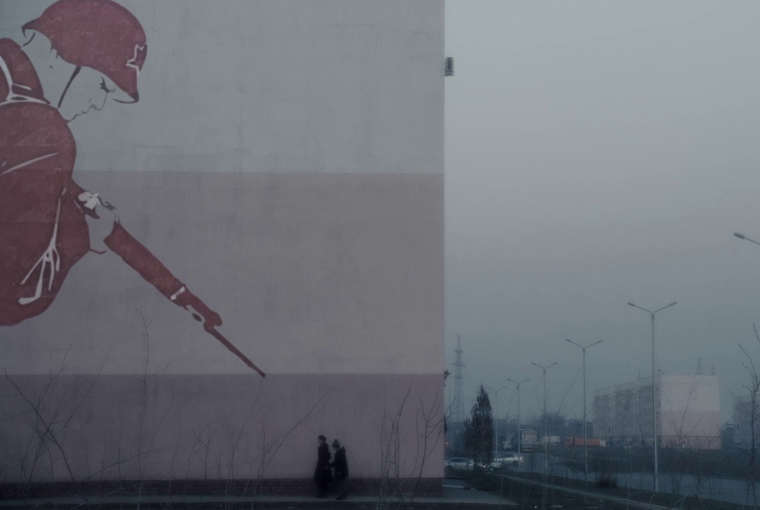Ghosts of Totalitarian Regimes
Adilkhan Yerzhanov’s Cadet (Kadet, 2024)
Vol. 157 (September 2025) by Martin Kudláč
One of the most prolific filmmakers in world cinema is without a question Kazakh auteur Adilkhan Yerzhanov, who has lately been premiering two films each year. 2025 has not been any different. After the world premiere of Cadet in late 2024 in Tokyo, Yerzhanov has followed up with the portmanteau film Kazakh Scary Tales (2025).
The Kazakh filmmaker’s filmography, consisting of films predominantly set in a fictitious Karatas village that now make up an entire cinematic universe, has been a combination of dark and gritty dramas with a thriller flavor. Cadet foreshadows Yerzhanov further embracing the horror genre within his signature type of dark tragicomedies, which has been sealed by Kazakh Scary Tales.
Cadet is set in a Soviet elite military school within the Karatas village, and strongly resembles the school from Yerzhanov’s previous hostage/school shooting drama Assault. Single mother Alina (Yerzhanov’s regular Anna Starchenko) signs up her teenage son Serik (Serik Sharipov) to the prestige school where discipline goes hand in hand with bullying. On the first day, Alina and Serik learn about the recent suicide of a pupil, which, as it turns out, is not a rare exception.
Serik is a bad fit for the school that is supposed to produce hardened military personnel. Short, a bit androgynous, and sporting a gothic look, his appearance does not fit the school. Alina and Serik are a package of two as Alina is also starting as a history teacher at the boys’ school with male-only pedagogical staff. Serik has a hard time adapting and the initial suicide is followed by another gruesome death. Serik, alien to the environment’s rigid hierarchy and cold camaraderie, becomes a target. When one of his tormentors ends up dead, an investigation follows, probing not only the death but the very structure that permitted it.
Yerzhanov’s signature austerity – long static shots, sparsely furnished interiors, and non-professional performances in flattened deadpan – dictates the film’s style. But Cadet also marks a formal shift. Unlike Assault (2022) or Yellow Cat (2020), which opened to broader social commentary via dark satire or genre subversion, Cadet retreats into a tighter, more claustrophobic narrative structure. Its setting, the enclosed, almost monastic military school, acts as a pressure chamber, magnifying the emotional friction between characters while reducing the absurdist digressions that often permeate Yerzhanov’s earlier works.
Cadet is not less referential than Steppenwolf (2024) or Goliath (2022), two previous works of his that drew explicitly from Western philosophical texts and genre tropes. Cadet aligns closer with A Dark, Dark Man (2019) in its tonality: muted colors, moral ambivalence, and an unfolding violence complemented by an iconography from the horror spectrum. The film continues in the line of ultra-violence that came to define Steppenwolf, with Yerzhanov embracing more horror genre tropes for the purpose of political subversion. The director took explicit inspiration from the subgenre of J-horror and the ghost stories inspired by the aesthetics of Hideo Nakata, albeit veering into folklore instead of the technological domain.
The presence of a supposed “ancient curse,” mentioned by students and whispered within the school’s walls, introduces a folkloric ambiguity, reminiscent of the narrative devices in Yerzhanov’s early work The Plague at Karatas Village (2016). While the first half of the film toys with the supernatural element for genre thrills, the director utilizes it as a metaphor for transgenerational trauma. The curse, real or imagined, is less an external force than a coping mechanism, a way for the young cadets to process what their institution refuses to name: systemic violence as legacy.
Cadet’s emphasis on systems – military, educational, patriarchal – continues Yerzhanov’s exploration of authoritarian remnants within post-Soviet society. From the impotent village bureaucrats of Realtors (2011) to the ineffectual SWAT response in Assault, Yerzhanov consistently depicts public institutions as mechanisms of entropy unable to serve, protect, or reform.
The military school becomes a near-symbolic relic: tradition masking abuse, discipline suppressing individuality, and ritual sustaining trauma. And more importantly, an integral part of the whole ruling eco-system. The only reason Serik and his mother are tolerated in the alien environment is because Serik is the illegitimate son of one of the military big wigs. And the school is supposed to serve as a factory for masculinism and tasked to turning androgynous Serik into a senseless being capable of carrying out drastic commands. The school is an indoctrination tool to ensure the sustenance of the prevailing regime.
Alina, played with notable restraint, exists in a parallel track to Serik’s journey. As a mother, her presence is anomalous within the patriarchal order of the academy. Her attempts to protect or intervene remain peripheral, often invisible, reinforcing Yerzhanov’s recurring motif of powerless witnesses, those who observe collapse from within but are structurally barred from preventing it. Her profession as a history teacher adds a layer of irony: surrounded by militarized myth-making, she is tasked with interpreting the past while being rendered voiceless in the present.
Yet with the arrival of the investigator, Alina’s position shifts from powerless witness. The mother-son bond comes to defy the rigid patriarchal ruling system and its invasive consequences as the investigator who does not believe in the supernatural immerses himself in the occult-folkloric circumstances of the rising body count of boys from Serik’s proximity. Yerzhanov toys with some outdated clichés borrowed from ghost and curse narratives for genre thrills and red herrings. However, the genre pastiche is in the service of the political statement and social allegory for which the director picks gruesome imagery with a slightly farcical tone.
Cadet combines the framework of a ghost story with psychological drama, marked by Yerzhanov’s characteristic dark humor. At the same time, it reaffirms his commitment to a lo-fi existentialist aesthetic. While many of his films depict systems in gradual collapse, here he draws on an easternized variant of pop culture filtered through post-Soviet imagery. The result is a masculine counterpart to Stephen King’s Carrie, though instead of focusing on puberty and sexuality, Cadet addresses the mechanisms by which regimes seek to perpetuate themselves and the role of institutionalized psychological indoctrination in sustaining them.



Leave a Comment